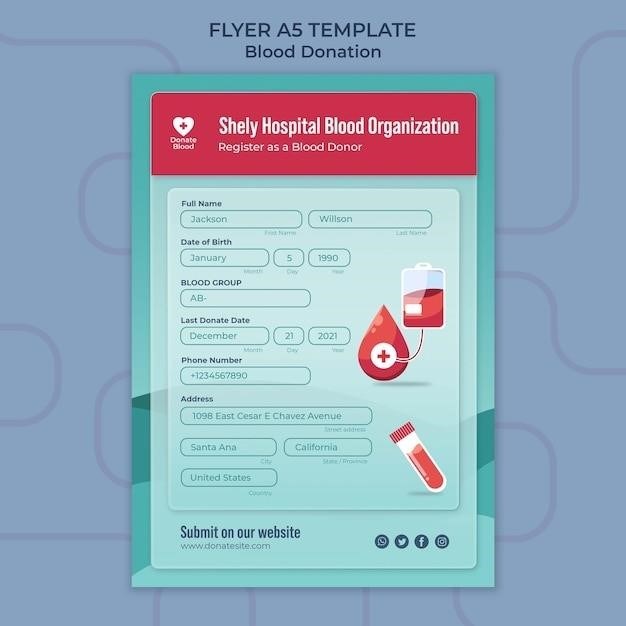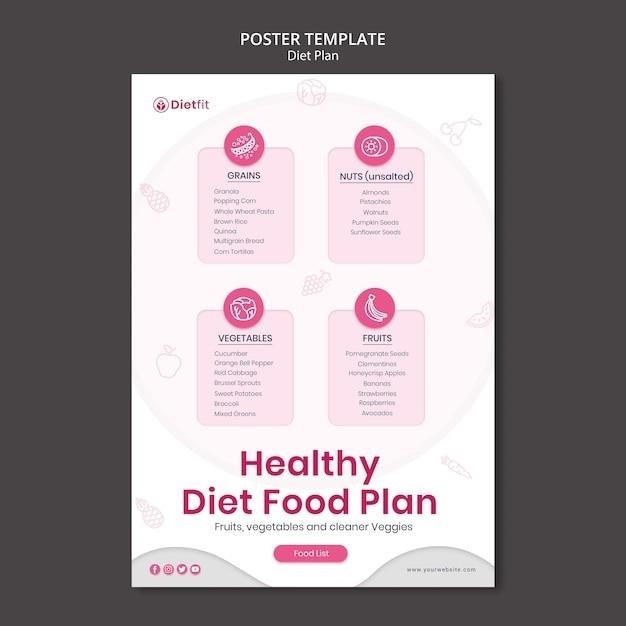B Negative Blood Type Diet⁚ An Overview
The B negative blood type diet emphasizes a diverse range of foods, including lean meats like lamb and mutton, various seafood such as tuna and cod, and dairy options like goat cheese and yogurt. It also suggests incorporating beans, grains, and a variety of fruits and vegetables for a balanced approach to nutrition. This diet often advises limiting or avoiding certain foods like chicken, corn, and peanuts, depending on individual health goals and sensitivities. Remember to consult a healthcare professional for personalized dietary advice.
Recommended Meats and Poultry
For individuals with B-negative blood, a diet rich in specific meats and poultry can be beneficial. Lean red meats like lamb and mutton are often recommended due to their nutritional profile. These meats provide essential proteins and iron, contributing to overall health and energy levels. Turkey, known for its lean protein content, is another suitable choice, offering a lighter alternative to red meats. When selecting poultry, prioritize organic and free-range options whenever possible to minimize exposure to antibiotics and hormones. Remember that portion control is crucial for maintaining a healthy weight and preventing excessive saturated fat intake. Proper cooking methods, such as grilling, baking, or roasting, are preferred over frying to minimize added unhealthy fats. Always consult a healthcare professional or registered dietitian for personalized dietary recommendations tailored to your specific health needs and goals. They can help you create a balanced meal plan that incorporates these recommended meats and poultry while considering any potential allergies or sensitivities.
Beneficial Seafood Options
Seafood offers a wealth of health benefits, and certain types are particularly advantageous for those following a B-negative blood type diet. Tuna, a readily available and versatile fish, is a great source of lean protein and omega-3 fatty acids, which support heart health and brain function. Cod, another excellent choice, provides similar nutritional benefits and is relatively low in mercury. For a wider variety of nutrients, consider incorporating other white fish like flounder or silver perch into your diet; These fish are generally lower in fat and calories compared to some oily fish, making them suitable for weight management. Shellfish like shrimp and scallops can also be included in moderation, providing additional protein and minerals. However, always be mindful of potential allergens and ensure the seafood is sourced sustainably to minimize environmental impact. Remember that mercury levels can vary in different types of seafood; consult reliable sources for guidance on safe consumption limits. A varied approach, including a range of seafood options, contributes to a well-rounded and healthy diet.
Dairy and Egg Choices
Dairy and eggs can be valuable components of a B-negative diet, offering essential nutrients and contributing to overall health. Goat cheese and other goat dairy products are often recommended due to their generally easier digestibility compared to cow’s milk products for some individuals. Consider incorporating these into your diet in moderation as part of a balanced approach. Cottage cheese, a versatile option, provides protein and calcium while remaining relatively low in fat. Other cheeses like feta and mozzarella can also be enjoyed, but mindful portion control is important to manage fat intake. Eggs, a nutritional powerhouse, offer high-quality protein, vitamins, and minerals. They can be incorporated into various dishes, adding flavor and nutritional value to your meals. However, individual tolerances vary, so pay attention to how your body reacts to different dairy products and adjust your consumption accordingly. If you experience digestive discomfort after consuming dairy, consider alternatives like lactose-free options or plant-based milk substitutes to maintain a balanced diet.

Foods to Include in a B Negative Diet
This section details the foods that are generally considered beneficial for those following a B negative blood type diet. These foods are believed to support optimal health and well-being within this dietary framework; Further details on specific food groups are provided below.
Highly Beneficial Vegetables and Fruits
For individuals with B-negative blood, incorporating a wide array of fruits and vegetables is crucial for a healthy diet. Leafy greens such as spinach, kale, and collard greens are excellent sources of essential vitamins and minerals. Cruciferous vegetables, including broccoli, cauliflower, and Brussels sprouts, offer valuable nutrients and support detoxification. Other beneficial vegetables include bell peppers (especially red and yellow), asparagus, and zucchini. These provide essential vitamins and antioxidants. Incorporating a variety of colorful fruits is also important. Berries like blueberries, strawberries, and raspberries are packed with antioxidants. Citrus fruits such as oranges, grapefruits, and lemons provide vitamin C and support immunity. Apples, pears, and avocados add fiber and healthy fats to the diet. Remember to choose organic produce whenever possible to minimize pesticide exposure. This ensures you are receiving the maximum nutritional benefits from your fruits and vegetables.
Grains and Legumes Suitable for B Negative
When following a B-negative diet, careful grain and legume selection is key. Opt for whole grains over refined options, as they offer more fiber and nutrients. Brown rice, quinoa, and oats are excellent choices, providing sustained energy and supporting digestive health. Consider incorporating millet and buckwheat, which offer unique nutritional profiles. Legumes are also beneficial, particularly those that are well-tolerated. Lentils, in particular, are a great source of protein and fiber, contributing to satiety and overall well-being. Soybeans and tofu, while sometimes debated, can be included in moderation for those who tolerate them well. Avoid or limit consumption of wheat, corn, and peanuts, as these are often associated with negative reactions in individuals with B-negative blood type. Always pay attention to your body’s response to different grains and legumes and adjust your intake accordingly. Prioritize organic and non-GMO options whenever available to maximize nutritional value.
Other Beneficial Foods
Beyond the core food groups, several other items can positively contribute to a B-negative diet. Olive oil, rich in monounsaturated fats, supports heart health and adds flavor to dishes. Nuts and seeds, such as almonds, walnuts, and flax seeds, provide healthy fats and essential nutrients. However, remember that peanuts are often discouraged. Herbs and spices, like ginger, turmeric, and rosemary, add flavor and offer potential health benefits, such as anti-inflammatory properties. Consider incorporating unsweetened cocoa powder, a source of antioxidants, into your diet. Remember to consume these foods in moderation and as part of a balanced diet. Always check ingredient lists to ensure products are free of unwanted additives or allergens. The inclusion of these additional foods can enhance the overall nutritional value and enjoyment of your B-negative diet plan, promoting both physical and mental well-being. Prioritize fresh, whole foods whenever possible for optimal results.
Foods to Avoid or Limit
This section details foods potentially problematic for individuals with B-negative blood types. These include certain grains, legumes, and specific fruits and vegetables often linked to adverse reactions or weight gain in some people. Careful consideration and moderation are key.
Foods to Avoid for Weight Management
For those with B-negative blood types aiming for weight management, certain foods can hinder progress. Chicken, often cited as a lean protein, might surprisingly contribute to weight gain in this blood type, possibly due to individual metabolic responses. Corn, a common staple, is frequently identified as a food to limit or avoid. Its high carbohydrate content and potential for inflammation in some individuals can lead to weight retention. Peanuts, while nutritious, are also frequently recommended for restriction due to their potential to impact weight management differently in individuals with B-negative blood. Wheat, another carbohydrate source, can be problematic for weight control in this blood type. These are general guidelines; individual responses vary, and personalized dietary advice is recommended.
Potentially Harmful Foods for B Negative
While individual reactions vary, certain foods may pose potential health risks for individuals with B-negative blood. These foods are not universally harmful, but some people with this blood type report negative experiences after consuming them. For instance, some individuals find that consuming excessive amounts of chicken can trigger inflammatory responses, leading to discomfort and potentially hindering overall well-being. Similarly, corn, often a staple in many diets, may cause digestive distress or allergic reactions in some B-negative individuals. Peanuts and wheat also appear on lists of potentially problematic foods; they might trigger sensitivities or exacerbate existing conditions. It’s crucial to note that these are potential issues, not universal experiences. Individual tolerance and reactions can differ significantly. Always monitor your body’s responses and consult a healthcare professional for personalized guidance.

Creating a Balanced B Negative Diet Plan
Developing a balanced B-negative diet requires careful consideration of individual needs and preferences. Prioritize nutrient-rich foods while minimizing potential allergens or problematic items. Consult a healthcare professional or registered dietitian for personalized guidance and support.
Sample Meal Plans and Recipes
Crafting a sample meal plan for a B-negative diet necessitates careful selection of foods known to be beneficial for this blood type. A typical breakfast might include oatmeal with berries and a dollop of yogurt, providing complex carbohydrates, antioxidants, and probiotics; Lunch could feature a salad with grilled lamb or tuna, incorporating lean protein and various vegetables. Dinner options could include baked salmon with roasted vegetables, offering omega-3 fatty acids and essential vitamins and minerals. Snacks could consist of fruits like pineapples or a small portion of cheese. Remember, these are merely examples, and individual needs and preferences should guide meal planning. Numerous online resources and cookbooks provide detailed recipes tailored to the B-negative blood type diet. It’s crucial to maintain variety to ensure adequate nutrient intake and prevent dietary boredom. Always prioritize whole, unprocessed foods whenever possible.
Tips for Successful Diet Adherence
Successfully following a B-negative diet requires a multifaceted approach. Begin by gradually incorporating recommended foods while minimizing those to be restricted, avoiding abrupt changes that can lead to frustration and setbacks. Keep a detailed food journal to track your intake and identify potential areas for improvement. Meal preparation is key; preparing meals and snacks in advance helps prevent impulsive unhealthy choices. Seek support from friends, family, or online communities for encouragement and accountability. Don’t be afraid to experiment with new recipes and find creative ways to enjoy the permitted foods. Regular exercise complements a healthy diet, contributing to overall well-being. Consult a healthcare professional or registered dietitian for personalized guidance and to address any concerns or potential nutrient deficiencies. Remember, consistency and a positive mindset are crucial for long-term success with any dietary plan.
